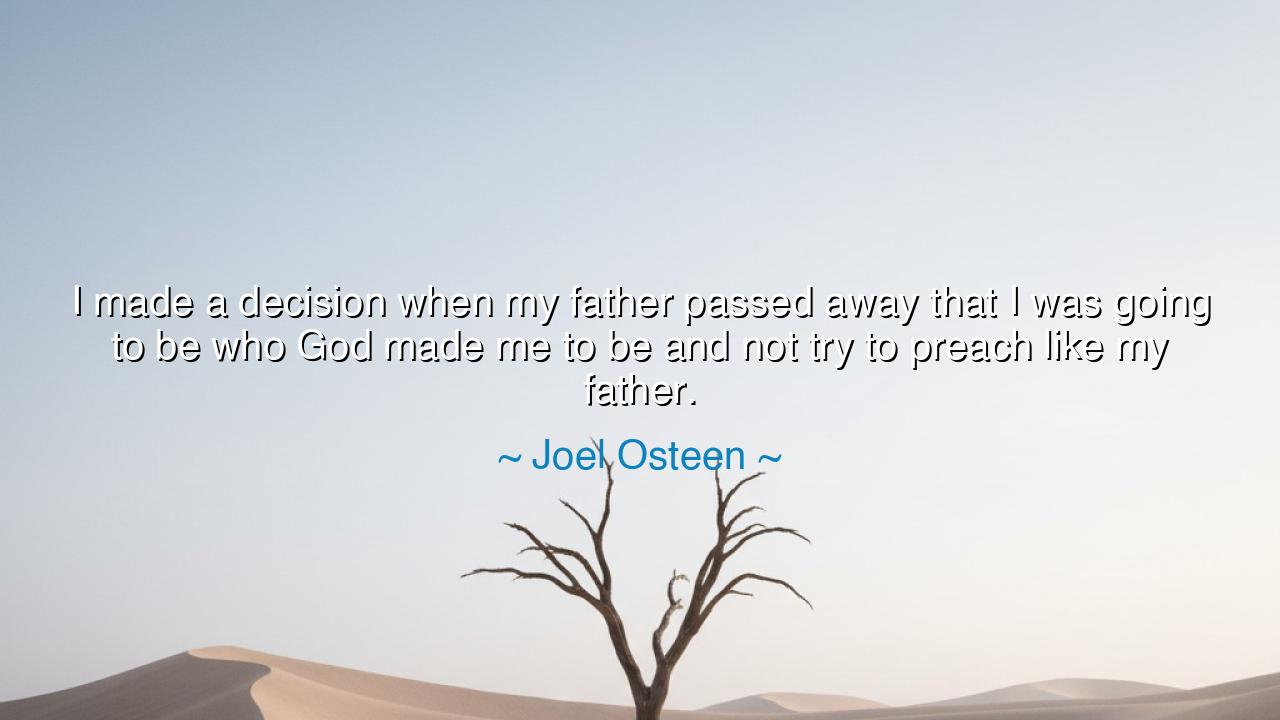
I made a decision when my father passed away that I was going to
I made a decision when my father passed away that I was going to be who God made me to be and not try to preach like my father.






The words of Joel Osteen, “I made a decision when my father passed away that I was going to be who God made me to be and not try to preach like my father,” echo like a psalm of self-realization and divine courage. In them lies the wisdom of a man who, standing at the crossroads of grief and destiny, chose authenticity over imitation, calling over comparison. This declaration is not merely about preaching—it is about the universal struggle of every soul to honor its inheritance without becoming enslaved to it. Osteen, the son of a great preacher, was faced with a sacred test that comes to all who follow giants: to carry the torch forward, but in their own flame.
In the ancient way, the father is the symbol of strength, wisdom, and tradition—the pillar upon which a life is built. To lose such a figure is to face both loss and revelation, for it strips away the shadow under which one has lived and demands the light of one’s own becoming. When Joel Osteen’s father, John Osteen, passed away, he inherited not only a pulpit but a legacy—a legacy radiant, heavy, and holy. Yet in that moment, Joel chose not to mimic his father’s voice, but to listen for the whisper of God within his own soul. He chose not to repeat the past but to embody his own purpose. In that choice, he fulfilled one of life’s most ancient commandments: to be who you were created to be.
This struggle between inheritance and individuality is as old as mankind itself. The story of David and Solomon mirrors it well. David, the warrior king, conquered nations and brought peace to Israel; Solomon, his son, could not be the same. His calling was not to fight with sword and spear, but with wisdom and word. Had Solomon tried to be his father, his reign would have failed; by embracing who God made him to be, he built a temple that endured for generations. Likewise, Osteen recognized that he could not preach like his father, for he was not called to fight the same battles or to speak in the same thunder. His ministry, though gentler, was no less divine—it reached millions not through imitation, but through authentic calling.
This quote, therefore, is not only about a preacher and his pulpit—it is about the sacred duty of every person to discern their own voice amidst the echoes of those who came before. Too often, we measure ourselves by others—the parent, the teacher, the hero—and in doing so, we bury our own purpose beneath their legacy. But as Osteen’s words remind us, true honor is not found in imitation, but in continuation. To honor those who came before is not to walk their exact path, but to walk our own with the same faith and courage they once showed. The wise understand that God writes no duplicates; each life is an original scripture written in the ink of eternity.
Consider also the life of Alexander the Great, who was taught by Aristotle and inspired by his father, King Philip of Macedon. Philip was a conqueror, and Alexander inherited his vision—but he surpassed it not by imitation, but by expansion. He did not merely defend what his father had built; he carried it to the ends of the known world. His greatness lay not in copying the father’s sword, but in wielding it with his own spirit. So too does Osteen’s lesson resound: we are each entrusted with the tools of our forebears, but we must forge our own destiny with them.
There is also a gentle humility in Osteen’s confession. To say, “I was going to be who God made me to be,” is to surrender to divine authorship—to trust that the Creator’s design for one’s life is sufficient and sacred. It is an act of faith against the fear of inadequacy. When we stop comparing ourselves to others, we free the spirit to blossom as it was intended. A rose does not envy the oak, nor does the river strive to roar like the sea. Each fulfills its purpose by being true to what it was made to be. And so must we, if we are to find peace and divine fulfillment.
The lesson, then, is clear and eternal: Be yourself as God made you, not as the world expects you. Do not fear to honor your heritage, but do not let it bind your soul. The voice of your father, your teacher, your hero—these are stars to guide you, not suns to replace your own light. Your task is not to repeat their greatness, but to continue their faithfulness in your own way. For when you embrace your individuality, you do not diminish your inheritance—you complete it.
So, dear listener, take Joel Osteen’s words as a call to courage. When life hands you the mantle of those who came before, wear it with reverence, but let it fit your own shoulders. Walk not in another’s footsteps, but upon your own God-given path. For in the end, it is not the imitation of others that honors them—it is the authentic life you live, the unique melody you offer to the divine symphony of existence. Only then can you say, with peace and conviction, that you have become all that God made you to be.






AAdministratorAdministrator
Welcome, honored guests. Please leave a comment, we will respond soon